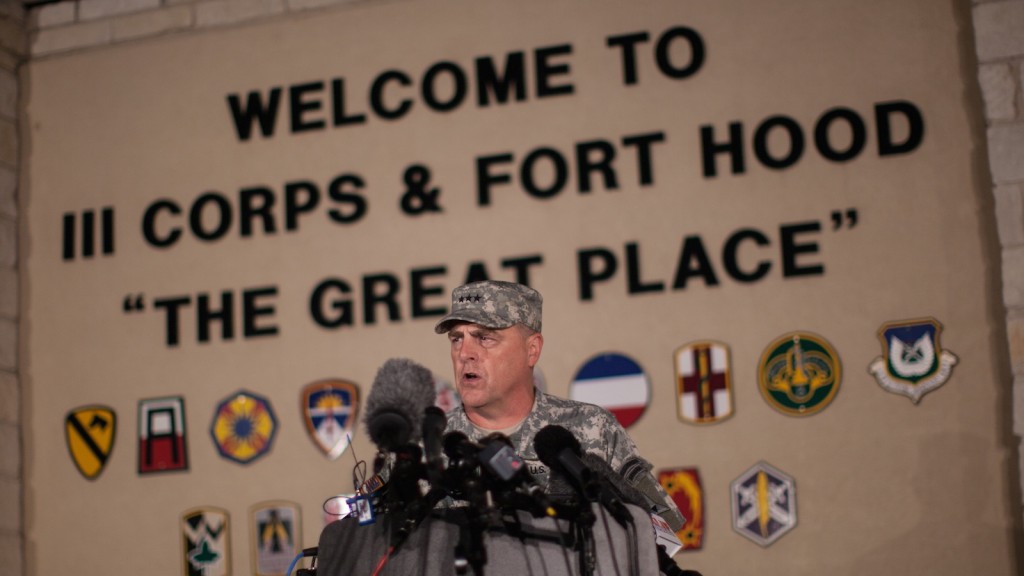Your morning five: Fort Hood endures another shooting
Also: Iqaluit’s prison is a disaster
Lt. Gen. Mark Milley, commanding general of III Corps and Fort Hood, speaks with the media outside of an entrance to the Fort Hood military base following a shooting that occurred inside, Wednesday, April 2, 2014, in Fort Hood, Texas. Four people were killed, including the gunman, and 16 were wounded in the attack, authorities said. (AP Photo/Tamir Kalifa)
Share

We tell you five things you need to know this morning.
1. Fort Hood endures another shooting. A soldier who’d served in Iraq in 2011, and suffered resulting mental health problems, shot and killed three serviceman at the Texas military base. He then turned his gun on himself. The weapon was reportedly a .45-calibre Smith and Wesson pistol purchased off-base. Unconfirmed reports have named the alleged shooter, but we’ll hold off on naming names until official confirmation. Fort Hood witnessed another shooting in 2009, when Nidal Malik Hasan opened fire and killed 13 people.
2. Iqaluit’s prison is a disaster. “Nothing short of appalling” is an official report’s opinion of the Baffin Correctional Centre, a facility designed for 41 inmates but which housed 106 when a watchdog paid a visit. CBC News acquired a devastating report penned by the Office of the Correctional Investigator. The overcrowded cells feature mould, a lack of heat, blocked vents, and insufficient bathroom facilities. This is not the 15 minutes of fame that Nunavut’s territorial government desires.
3. Lebanon is home to a million Syrian refugees. Lebanon’s non-refugee population is only around 4.5 million. The country has limited capacity to support such a massive influx of new bodies from a civil war-ravaged neighbour, especially as sectarian conflict bleeds across the border. Earlier this year, Prime Minister Stephen Harper delivered $100 million in aid to Jordan, another Syrian neighbour bulging with displaced residents. No such luck so far for Lebanon, a country nowhere near as close with Canada as King Abdullah’s Jordan.
4. The Taliban’s fear campaign is working. Voters may flock to Afghanistan’s polls, relatively speaking, on April 5, despite Taliban attacks on western and government facilities in Kabul. But the New York Times explains that in some parts of the troubled nation, where government has virtually no presence or ability to enforce the law, voters won’t risk casting a ballot. The Times identifies Charkh, south of Kabul, as one of many communities officially cleared by security forces but too dangerous for many locals.
5. No one messes with Sheila Fraser. The popular former auditor general’s opinion is gospel. Her audits revealed the sponsorship scandal that buried a former Liberal government. She’s both an accountant and a household name in Canada, a feat thought impossible by anyone who’s ever met an accountant. Yesterday, Fraser rejected much of the government’s proposed electoral reform, another expert in a long line that the Tories will dismiss. She called the bill an “attack on our democracy.” One more name off the 24 Sussex Christmas list.
BONUS: Maclean’s political editor Paul Wells won the Shaughnessy Cohen Prize for Political Writing for The Longer I’m Prime Minister: Stephen Harper and Canada, 2006-. He took home the award at the annual Politics & The Pen Gala, which is the party to end all parties in the nation’s capital.